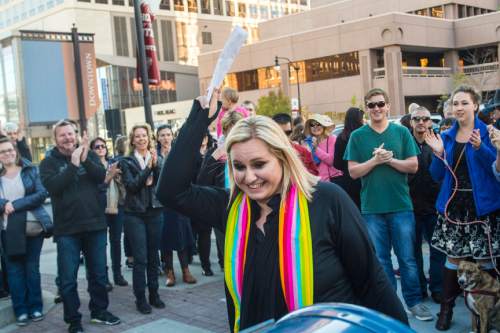This is an archived article that was published on sltrib.com in 2016, and information in the article may be outdated. It is provided only for personal research purposes and may not be reprinted.
When you are on top, it's all about order and tradition. When you aren't, it's all about freedom.
Sometimes it's all about the freedom to remain on top, like you used to be, before you weren't, for reasons that couldn't possibly be your fault.
For many in Utah — primarily members of the LDS Church — it's everything at once.
As they look at the current presidential campaign, many Mormons feel sympathy for Muslims, Hispanics and others who have been made the bogeymen of Donald Trump's presidential campaign. That, in addition to Trump's libertine lifestyle, is why Utah this year is not necessarily the lock for Republicans that is has been for nearly 50 years.
Not only do Mormons know their history of being victims of such demagoguery, a great many of them have also lived in Third World nations and aren't so easily threatened by people of different skin tones.
The not-so-noble flip side of the LDS identification with victims is that many Mormons — at least those whose words get published in newspapers — are quivering in their boots at the prospect of organized religion losing the automatic authority, culturally and politically, it has long taken for granted.
Warnings that our — or, at least, their — religious freedoms are being threatened are increasingly common, being exploited for partisan gain and, in nearly every case, utterly bogus.
Experts at Gallup and elsewhere tell us that Trump's core support is not coming so much from the demographic slice one might expect, low-income folks who have actually lost a job to an immigrant or a trade deal.
Mostly, we find, Trumpkins are relatively well-off white folks, mostly men. Many of them still have a good blue-collar job or are retired in relative comfort, but are unsettled by the clear fact that they — white, male, nominal Christians — are no longer the default ruling class.
Not only have they not been assaulted by a black man on parole or lost their job to an undocumented Mexican, they don't know anyone who has. They also don't know any black folks, Hispanics or Muslims. But they are still upset by what they think has happened to their America.
Press 2 for English. Kenyans in the White House. Members of the U.S. Olympic team wearing hajibs. People who insist on pointing out that the vast majority of those killed by Muslim terrorists are other Muslims. Smartphone videos proving that some of the black folks shot by the police did not clearly have it coming.
It's just not right.
You can tell that religious freedom is alive and well because America is way more religiously diverse than it has ever been. Not only are there more Muslims here, there are ever-rising numbers of folks, mostly among the young, who follow no organized religion at all.
That means people are choosing for themselves what religion to follow, or not to follow, rather than having it chosen for them by peer pressure or tradition. Such choice is the core of freedom.
Of course, one person using her freedom to make a choice that another person wouldn't make isn't always seen as freedom, because it interferes with the second person's precious right to be surrounded by, or to rule over, people like him.
Recently, LDS Apostle Jeffrey R. Holland warned, in a mostly nonpolitical way, that America is threatened by a wave of secularism that will destroy our morals and well-being.
And Sen. Orrin Hatch argued, in a totally partisan diatribe, that Democratic presidential candidate Hillary Clinton is a false friend of religious freedom.
Holland is wrong, of course, because the trend away from organized religion parallels — though it would be foolish to say it caused — huge improvements in equality, education, sexual health, infant mortality, violent crime and literacy.
And Hatch is wrong because the focus of his weak attack is a valid position taken by Clinton and other Democrats, their Obamacare argument that contraception should be included in every real health care plan.
Hatch and others keep thumping the tub of the poor little Little Sisters of the Poor, a Catholic charity that claims that merely filing an opt-out form is a vile violation of their religious freedom.
The argument that people shouldn't be forced to do, or pay for, things that violate their principles should always be treated with respect. But this is a point that religion has, or should have, lost.
Contraception is basic to health care. Full stop. Don't like it? Don't use it.
And if each person's own sense of right and wrong exempts us all from our basic duties under law, then I'm waaaay overdue for a big tax refund.
Sure, even if the IRS repaid my full share of Iraq, Guantanamo, torture, wiretapping, subsidies to oil companies and drone warfare, I might be able to take you out to lunch. And if the Utah State Tax Commission calculated my refund for firing squads, attempts to seize federal lands, anti-gay lawsuits and police raids on people with marijuana pots, maybe we could split a dessert.
But, as is rightly argued by the people wrongly spreading the alarm about the collapse of religious freedom, it's not the money. It's the principle of the thing.
Those principles correctly motivate voting decisions and inspire other political activities. But they don't exempt you from the results of the process.
George Pyle, a Tribune editorial writer, failed in his attempt to claim conscientious objector status from his junior high school gym class.



